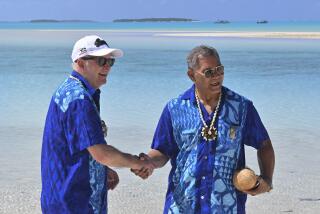DotTV Is Channel for Island’s Hope
Plenty of entrepreneurs have ventured onto the Internet in search of money, fame or power. But the tiny Pacific island nation of Tuvalu is probably the only country that can thank the Internet for bestowing political clout and diplomatic legitimacy.
Tuesday, Tuvalu will realize a long-held dream by becoming the 189th member of the United Nations. After a vote by the General Assembly, Tuvalu’s flag--turquoise with streaming yellow stars and the Union Jack in the corner--will be raised outside the U.N.’s headquarters in New York City.
Tuvalu, which has yearned to join the United Nations since it won its independence from Britain in 1978, until recently could not afford to pay the dues required of U.N. member states.
Now it can. Tuvalu’s 10,600 residents owe this sudden change to Pasadena Internet business incubator Idealab and their own alphabetical good fortune.
Idealab was convinced it could sell electronic mail and Web addresses to TV networks, programs and other customers ending in Tuvalu’s country code, “.tv” instead of the congested “.com.” So Idealab’s start-up, called DotTV, this spring agreed to pay Tuvalu (pronounced too-VAH-loo) a royalty payment of at least $1 million each quarter for more than a decade.
Income from the deal has become the single largest source of revenue for a nation that previously relied on subsistence farming, fishing, exporting stamps and foreign aid.
“We felt we should join the brother nations,” said Prime Minister Ionatana Ionatana, who expects the Polynesian country to benefit from the U.N.’s education and development programs. “There have always been good reasons to join. Now we’re in a position to pay our fees.”
Dues for the 2000-2001 session will be set after the U.N.’s session convenes Tuesday. As one of its smallest members, Tuvalu will be responsible for 0.001% of the organization’s total budget. Last year, that would have amounted to about $10,000. After joining related organizations, such as the U.N. Development Program and the U.N. Educational, Scientific and Cultural Organization, Ionatona figures Tuvalu’s annual dues will add up to about $30,000.
Last week, Tuvalu also became a full member of the British Commonwealth, which requires annual dues of about $40,000, Ionatona said.
Tuvalu’s partnership with Idealab has also produced some tangible results. Already the government has built two primary schools that each serve 100 students, and it plans to build two more in each of the next two years. The government has also purchased water desalination equipment to alleviate the effects of a long drought and intends to pump ground water from wells.
The main road on the largest of Tuvalu’s nine coral atolls is set for an upgrade, and the airport runway in the capitol city of Funafuti will be lengthened to accommodate small jets. (The runway is currently limited to prop planes, which arrive and depart once a week.)
Tuvalu has also ordered generators to supply electricity to seven of its eight outer islands. (The last island is inhabited by only 50 indigenous people, who can do without it, Ionatona said.) Electrical power is scheduled to come on Christmas Day. After that, the country will install a television broadcasting tower to reach the islands, the farthest of which is more than 300 miles from the capitol.
Ionatona said about 1,000 Tuvaluans have expressed their appreciation for the windfall, which is larger than originally expected. In addition to receiving quarterly payments, Tuvalu owns 20% of DotTV. When Idealab bought back some shares of DotTV earlier this year, Tuvalu netted a $12.5 million profit.
Since April, DotTV has persuaded more than 40 broadcasters to switch their online identities from .com to .tv, including the PAX TV network and Burbank-based KNBC. Altogether the company has sold more than 50,000 Internet names at prices ranging from $50 to $500,000 a year, said DotTV Chief Executive Lou Kerner.
Situated halfway between Hawaii and Australia, few residents of Tuvalu can log on to the global computer network that has become the source of their newfound wealth. Koloa Talake, a member of Tuvalu’s parliament who sits on DotTV’s board of directors, estimates that no more than 500 people--mostly government officials and civil servants--have had the chance to use the roughly two dozen computers on Tuvalu’s main island.
Talake himself began surfing the Web only a month ago, and it has already become a 40-hour-a-week activity for him. (The news junkie’s favorite sites are CNN.com and Fijilive.com.)
Tuvalu submitted its application for U.N. membership on Jan. 5 by pledging to fulfill the obligations of the U.N. Charter and submitting a one-page document to the U.N.’s secretary general. The Security Council voted 14-0 in February to accept Tuvalu into the U.N. (The one abstention came from China, which disapproves of Tuvalu’s diplomatic relations with Taiwan.)
Tuvalu will become one of the smallest members of the U.N. Nauru--an island nation in the South Pacific that joined the U.N. last year--has less land, but it has more people. But Tuvalu need not feel small, said Tatiana Cosio, secretary for the U.N.’s Committee on the Admission of New Members.
“Under the U.N. charter, all countries are equal, no matter their size,” Cosio said. “You have China and you have Liechtenstein. When they become member states, they have the same vote.”
For Tuvalu, U.N. membership is certainly a big deal. Ionatona is making plans for a party when he and his delegation return home later in the week.
The way Talake sees it, Tuvaluans certainly have much to celebrate.
“We are so thankful to Idealab for creating this new company,” he said of DotTV. “People in other parts of the world never thought of investing in a place like Tuvalu. It has changed the quality of life in Tuvalu a lot.”
*
Times staff writer Karen Kaplan can be reached at karen.kaplan@latimes.com.
More to Read
Sign up for Essential California
The most important California stories and recommendations in your inbox every morning.
You may occasionally receive promotional content from the Los Angeles Times.











